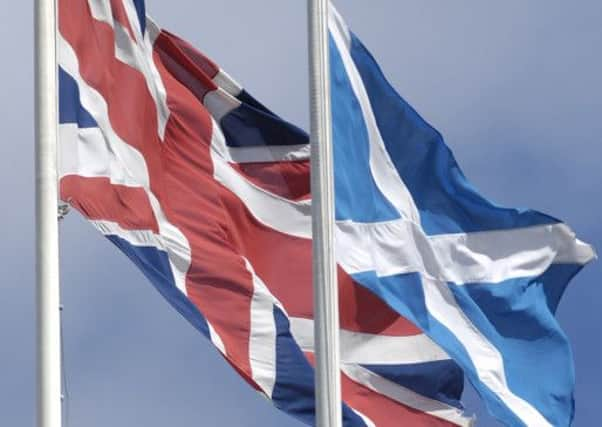Bill Jamieson: The costly divorce of independence


HOW might a Yes vote for independence affect financial markets? And what are the broad questions that would concern those with investments in Scotland and, more generally, those who hold sterling assets?
Two independent assessments have been released in the past ten days by analysts working for non-UK banks and who could thus fairly be considered as unbiased sources. These reports have received scant attention in the Scottish Press thus far and do not seem to have registered with those in the media commentariat who have been prominent in the independence debate.
Advertisement
Hide AdAdvertisement
Hide AdAs an aide to discussion, and in the interests of a more fully informed debate, I present without comment the key points of the two papers here.
I do so for two reasons. In the past few weeks I have received e-mails from readers anxious about their investments with Scottish financial institutions and the tax status of these investments.
A senior investment adviser has also written to say: “A very significant percentage of our business/income comes from English clients, and some have already said they’d have to seek English advisers if we end up in an independent country.”
The second is that the issues raised in these assessments were also repeatedly raised by the audience at a Scotsman Conferences seminar on the wealth management sector last Thursday morning. Overall, the sector in Scotland has funds under management of £800 billion – much of it on behalf of savers outwith Scotland. And this money is mobile.
The first paper, circulated last week, was written by Caroline Winckles CFA, analyst with Swiss bank UBS. The second is from Peter Dixon, economist at Commerzbank, released on 25 April.
In the event of a Yes vote, the UBS analyst concludes: “We can expect significant volatility to ensue given the enormous uncertainties around the outcome of subsequent political negotiations. Sterling would attract a higher risk premium due to erosion of business confidence as well as higher cross-Border transaction costs.
“We assume that some manner of formal currency union would emerge in the event of independence. The market impact would hinge on the commitment to a strong set of checks and balances. Under a formal currency union, a Scottish government bond is estimated to yield 72 to 165 basis points over the equivalent UK gilt.
“Outside a formal currency union, the spread would be linked to its credit rating. Within equities, the financial, energy and utility sectors are those most exposed to Scotland and therefore most likely to be affected.
Advertisement
Hide AdAdvertisement
Hide Ad“Market impact: Big increase in volatility in UK-linked assets as negotiations get underway. Sterling weakens as it requires higher risk premium, dependent on form of currency link with independent Scotland Gilts supported by guarantee from HM Treasury.
“FTSE-100 weakens on raised political uncertainty. Listed shares (with) direct Scottish exposure suffer the most (estimated at three per cent of market cap).
“While the impact on the aggregate index is relatively limited, the impact on individual companies could be much greater, particularly those with large operations in Scotland, irrespective of whether they are headquartered there”.
The key points from the Commerzbank paper (“Breaking up is hard to do”) are as follows:
“In terms of the economics, the analysis of the pro-independence camp woefully fails to account for the costs of secession but the anti-lobby is also overdoing the gloom.
“In the event of a Yes vote, full independence is planned for March 2016. This is extremely unlikely to happen.
“Even assigning the bulk of energy revenues to Scotland, the public deficit relative to GDP is higher than in rUK. It is far from clear whether the Scottish Government will be able to meet all its long-term fiscal commitments without recourse to higher taxation.
“Since an independent Scotland would be a smaller and more open economy than rUK, it would have to rely more heavily on taxing immobile factors such as property.
Advertisement
Hide AdAdvertisement
Hide Ad“The Institute for Fiscal Studies points out that ‘if the government of a Scotland independent from 2016 felt the need to introduce taxes or spending cuts equivalent to those pencilled in for the UK as a whole for 2016-17 and 2017-18, that would require £2.5 billion of new measures’.
“If it also wanted to offset the decline in North Sea revenues by 2017-18 forecast by the OBR, that would require a further £3.4bn.
“As at end-2012, we calculate that the balance sheet of RBS together with the remainder of HBoS was around 13 times the size of the Scottish economy. By contrast the UK banking sector (which includes the Scottish banks) measured more than four times GDP – high in an international context but exposure levels were one-third that of an independent Scotland. To put that into perspective, Irish bank assets at end 2007 were six times GDP which clearly highlights the risks to an independent Scotland in the event that the banking sector ran into difficulties.
“In the event that Scotland were to go it alone, there is a strong possibility that the major Scottish banks may relocate to London in order to benefit from the lender of last resort facilities offered by the Bank of England.
“The rest of the UK would also be affected by Scotland’s departure. It would have a diminished presence on the global stage and there would also be an impact on domestic political dynamics.
“This is one reason why the debate over divorce proceedings, which has been amicable so far, could become less so in the event of a Yes vote.”
For the avoidance of doubt, I do not invent it, I only report it.
Standard Life, Alliance Trust and BlackRock have already publicly expressed concern or indicated they are opening offices south of the Border. Others are actively considering doing so. «